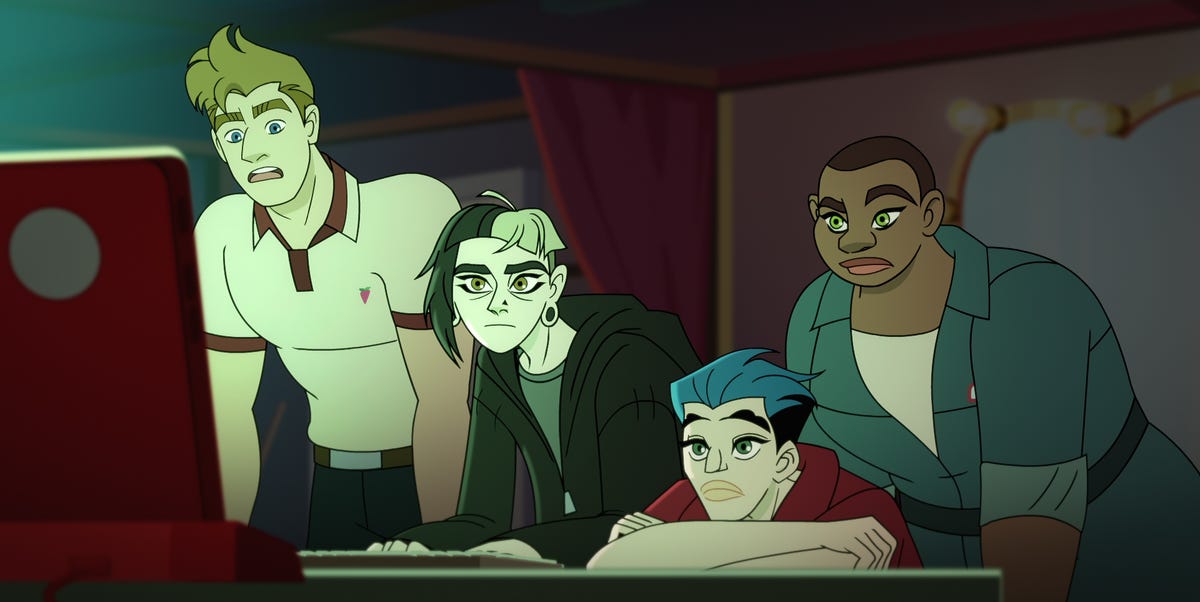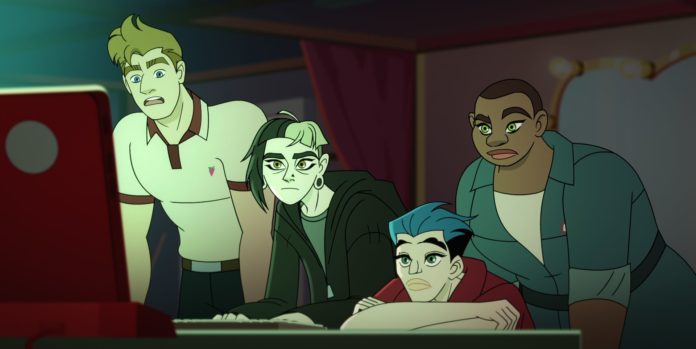
I don’t know how else to say it—I had gay voice growing up. Still kind of have gay voice. It’s not a pejorative, so much as it’s a fact. Growing up, there were gay kids who could duck and cover when it came to their sexuality, and then there were kids like me who get called by their mom’s names when they answered the phone, even though they were fourteen years old and the time for that should have passed. You get to a point where you are angry about it. Or you mask it. Eventually, you try to accept it, and if life really goes your way, you embrace it.
Stereotypes like “gay men with effeminate voices” are like tee ball practice for a particular kind of asshole. Those kinds of people tend to utilize the joke to the point where you feel like you have to work harder, be tougher, do more. Especially in circles with other men. I’ve always known there was someone thinking of me differently than the rest, because in a way, I was. And then I watched this animated series Q-Force on Netflix which seems to bathe in the stereotypes. But it stars queer people, was written by queer people, and is set in the world of the highest level of spy work.
The show is, at its base level, a cartoon. But after getting a few episodes in, I started noticing that in this show, all the things that make growing up gay difficult are superpowers, in a way, for these characters. The one that sticks with me hardest is the most flamboyant of the crew: Twink. He’s brash and outspoken. An effeminate drag queen, which so happens to also be his greatest strength on the team.
Little realizations like that only strike you if you’ve had those words used against you, so I asked Matt Rogers, who voices the character of “Twink,” where his head was on it. He grew up in Long Island, which is New York, but in his words “pretty conservative, to be honest.” But even being adjacent to a super liberal place like Manhattan, you still get it. You know what it’s like for a part of you to feel like a hindrance.
“I completely understand that… I think I was still doing a sort of ‘masc drag’ with myself until I was probably 21, 22 years old. And it wasn’t until I started reporting Las Culturistas, safely with my best friend, Bowen Yang, that I even started to really find out who I was comedically and my own persona and my own self.”
This content is imported from YouTube. You may be able to find the same content in another format, or you may be able to find more information, at their web site.
We’re the same age—that strange Glee-generation that realizes how progressive it feels to have a show with queer characters, while still being able to clock a stereotypical representation within seconds. That was the problem with Q-Force to start. Its teaser trailer, which Netflix launched during Pride month, featured Twink prominently. He was doing nothing impressive though. Netflix marketed the character as a collection of catchphrases: Yas queen and Hey girl! and the like. Many on social media reacted swiftly with a big “no.” This is not the representation we need, they said.
“I’m going to be completely honest with you. I think that the queer community is a lot smarter than to judge something that Netflix marketing put together for Pride in 40 seconds,” Rogers says. “That being said, I don’t think it was a great teaser. I don’t think it was very indicative of what the show is.”
The stereotypes exist in the show, sure, but we’ve been so conditioned to recoil at them—whether to self-preserve or chastise those we think are making fun of us—that we rarely get the time to sit with them. I’ve seen the effects of my own internalized homophobia get in my way. I’ve twitched at the numerous yas queen characters I’ve seen over the years because I’ve seen what happens to me when I let my own flamboyance come out. Stereotypes like that are difficult because, even when they contain truth, they’ve been leveraged against us for so long that we’re more willing to burn that part of ourselves than embrace it.
And even though that type of character might make queer people uneasy, assuming the writers of Q-Force have used Twink as a joke, Rogers and I agree that the fully realized, non-teaser version of the character is something so much larger than that. “He knows he’s good at what he does, and he knows he has a lot to offer. And so, if you noticed him, positive or negative, he won.” The way he’s written, Twink cannot be bothered with being a punchline. He exists above it.
This content is imported from Instagram. You may be able to find the same content in another format, or you may be able to find more information, at their web site.
It’s how Q-Force manages to empower the things we’ve learned to curb within ourselves. Twink is a spy who can assume any disguise, particularly in the way of feminine figures. If he were a masculine guy… a man’s man, if you will, he wouldn’t be good at his job. If he had a deep voice, then none of this would work. The thing I’ve run from most of my life—hell, the thing I have to constantly remind myself is part of what makes me, me—is what makes Twink exceptional.
Rogers helped write the character, throwing bits of himself into the role, saying, “I just loved that he was unfiltered. I loved that he was completely unafraid to be himself. I love that he always said the very first thing that came to his mind. Even if it wasn’t asked for, he had the bravery and the gall to say it.” Twink now exists as an example, in the superhero genre, of a stereotype reclaimed. How can they use it against you, if it’s something that gives you strength? “What we have here is essentially a very heightened version of a very unfiltered, fun, gay as sex positive, unafraid, unabashedly gay shade of myself, which I’m really proud of.”
That sentiment is what makes the show stick the landing. And considering that the cast is voiced by queer men and a Black lesbian and a trans woman and a whole litany of queer side characters, Q-Force offers an opportunity to see versions of ourselves on screen. Sometimes stereotypical, but in this series, the stereotype bites back. Q-Force feels special because it’s a reminder that our stereotypes were always available to be weaponized. This time, it’s the queer people who get to leverage their own power, with no shame.
And if you’ve stuck around, and you’re like, “My God, he wrote a lot of words about feeling seen in a cartoon,” you’re right. It might have been jumpstarted by drinking a half bottle of wine and looking my thirties in the mirror, and asking how I’ve evolved or how I’ve accepted who I am, but it also comes from the truth that in some ways, we’re all trying to become the best version of ourselves without divorcing ourselves from what makes us complete.
Because of who I am, I excel. And the closer I get to making that belief a part of me—the closer you get to making that belief part of you—means that we’re closer to getting it right.
This content is created and maintained by a third party, and imported onto this page to help users provide their email addresses. You may be able to find more information about this and similar content at piano.io








